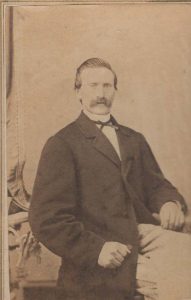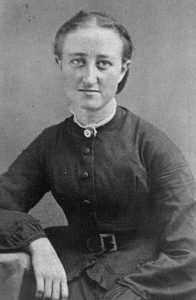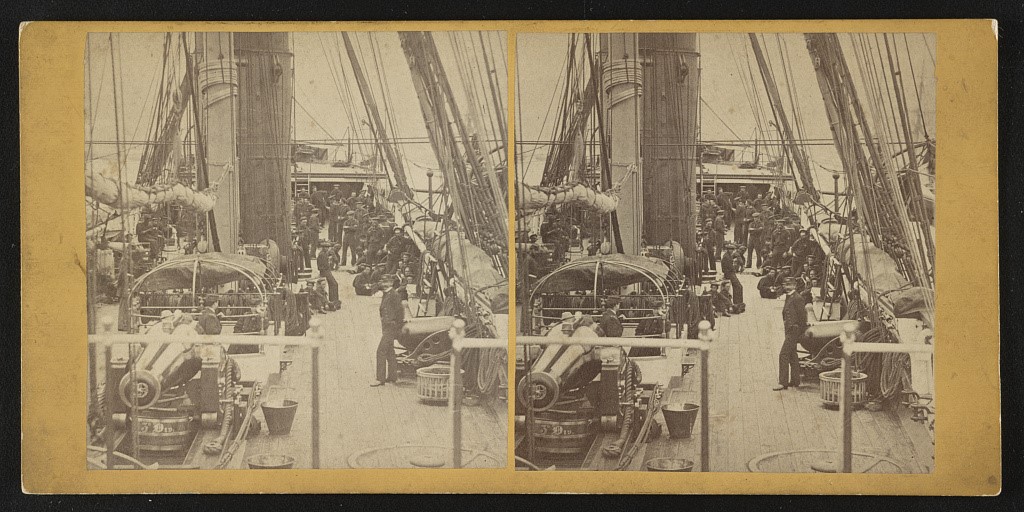
Although the term PTSD (Post-Traumatic Stress Disorder) did not come into widespread use until a century after the Civil War, the aberrant and antisocial behavior of Irving Brewster Delano (1840–1905) of Fairhaven, Massachusetts, seems to fit some of its symptoms. He served in the United States Navy from October 1862 until October 1863 aboard the U.S.S. North Carolina, Dacotah, and Alleghany. Irving’s family entry in the prodigious genealogy, The American House of Delano, gives details on his marriage and the births of his three children but neglects to mention his divorce.
From the evidence of the Delano family gravestone in Riverside Cemetery in Fairhaven, with full dates for birth and death, Irving would seem to be tucked in the family plot among his parents and three of his siblings. In fact, though, he died far from home in Haskell, Polk County, Florida, where he had lived as a lone Yankee for the last twenty years of his life.

Married at 28 to Mary Bethiah Paine, Irving ceased to be a mariner after the Civil War and eked out a living as a farm laborer. His marriage exploded after seven years. Eight months pregnant with their third child, Mary filed for divorce, citing her husband’s extreme cruelty, and charging that Irving was guilty of “cruel and abusive treatment [in] wantonly and cruelly refusing” to provide support for her and their children. Irving did not appear in court to answer charges. His property was attached for $1,000.
Two months after Mary’s petition, their marriage was dissolved, and she resumed her maiden name. Four years later, she married a whaler from the Azores, Mariano Silva. They raised Irving’s children and four more of their own. When the Silvas bought a farm in Marion, Massachusetts, Mary’s former mother-in-law, Elizabeth Delano, gave them a team of horses – a telling sign of continued respect for Mary.
After the divorce, Irving returned to his mother’s house for the next ten years. He still claimed to be married in the 1880 census. In 1885, he purchased ten acres in Florida where he lived in an isolated shack, his nearest neighbor half-a-mile away. Clearly, Irving’s life had taken a different tack.
[As] the first loader firing a salute aboard the U.S.S. Dacotah, he lost most of his hearing. Vertigo and incessant humming inside his head ensued from that time.
Examining Irving’s extensive Civil War pension file helped me conjecture why it did. The war indeed had damaged him. On 12 March 1883, he qualified for a disability on the basis of total deafness in his right ear and partial deafness in his left. Irving recounted that twenty years earlier, off the coast of Monroe, Virginia, as the first loader firing a salute aboard the U.S.S. Dacotah, he lost most of his hearing. Vertigo and incessant humming inside his head ensued from that time.

Irving’s deposition stated that “I was never treated in any hospital as the ship’s surgeon said it would be useless.” He finished his term of naval service as a coal heaver. Amid the documentation amassed in his file, one doctor wrote, “I consider him unfit or in other words unable to do any hard manual labor, if it were possible for him to obtain it, for no one will employ an unsound man when they can get one in full health.” While these examining physicians took into account Irving’s physical disability, no one at the time likely gave any consideration to how trauma could have impacted his mental health.
Irving’s children remembered him gently. They maintained contact through letters. His daughter Evelena named a son Irving Delano Caswell, and his name endured in later generations of her family. By the early 1930s, Irving’s son, Harvey Delano, loved to tell friends and acquaintances that his father and FDR’s mother were second cousins. A famous name sometimes covers a multitude of transgressions.
I found this very interesting as we had a student researching Civil War PTSD two years ago. He spent many hours going through Wisconsin mental health records to identify victims. Unfortunately, he could not tell their stories by name as they are still covered by privacy laws,but he found many, many instances where PTSD was the cause on institutionalization.
I have often wondered about the affects of Civil War trauma. Those soldiers saw and participated in the most horrendous, bloody, hand-to-hand battles. Thousands killed in a day. Then the survivors marched on to the next encounter.
We have the military records of one of my husband’s great-grandfathers who fought in the war. He served during the entire four years and participated in several battles. Did he have nightmares? The subsequent three generations lived together in the same house for decades. Was he militant with the children and his wife? No family stories passed down. My father-in-law was about 7 when his grandfather died, and he didn’t talk about childhood memories, so maybe the man was able to move on with life in a normal way. But what about the thousands of other veterans?
My impression is the topic is understudied. Over the last few years, while researching other families, I have noticed a spike in the number of divorces in the late 1860s and 1870s. In almost all instances, the husband served in the Civil War.
I agree that it is understudied. I would like to know more, and I will look for the book mentioned by Carolyn Converse Cooper, below. Three of my husband’s great-grandfathers fought in the Civil War, i don’t know (yet) about the fourth. My thoughts have been with those families who lived on isolated farms. I’m sure there were wife-beatings, suicides, abuse towards children; all the ills that happen in any society, but there were no support systems — not even a neighbor to run to for safety.
My two g.g.grandfathers in Hagerstown MD, lived in the middle of the war zone although they were not, as far as I can tell, soldiers. One died in 1864 (cause unknown) aged 45, and the second committed suicide in 1878, The newspaper article about him said he had been suffering from depression for some time – PTSD? See also “Too Afraid to Cry – Maryland Civilians in the Antietam Campaign” by Kathleen A. Ernst, Stackpole Books, 1999..
I have 3 gr gr grandfathers who served in Civil War: one committed suicide after a “depression” and left a wife and 3 children, another deserted his family and was later found in a veterans home in Maine(he hailed from N.Y.), and the third deserted his wife and started a second family in another state which was never discovered til future generations. As the daughter of a WW 11 vet and wife of Viet Nam vet, I was told by them that they were told to return home to their lives and not reveal a lot of their combat experiences which they did. I never heard of ptsd until more recent wars in Middle East.
Hard to believe anyone could come out of that horror WITHOUT PTSD.
I must take issue with the continued use of the term “disorder” when referring to post traumatic stress; may I suggest that, rather than a disorder, it is a body’s (and mind’s) natural response to witnessing horrors a human being was never meant to witness. I agree, the subject of post traumatic stress in the Civil War begs much more research and study.
Excellent article.
I found this article so interesting. My gr grandfather was in the IL Calvary serving 4 years and in Sherman’s march to the sea. In one battle he was taken prisoner, but his town bought his freedom. He soon was back in battle. After the war was over, he married my gr grandmother, but 5 years later they lived in separate households & she worked very hard to support her 2 sons.
My gr grandmother’s uncle was killed in the Civil War. He had asked his brother, her father, to take care of his wife, who lived on the adjacent farm. And he did….my gr gr grandparents marriage ended in divorce as my gr gr grandfather ran off & married his sister in law.
To make matters worse, the 3 sons of my gr gr grandparents were all wounded in the Civil War, dying at young ages from their wounds. If not for the Civil War, these families would not have been so traumatized.
My maternal gr grandfather fought in the Civil War in the Missouri Militia attached to the Union Army from June 1861 through July 1862. He was an Irish immigrant from County Tipperary which was one of the hardest hit counties during the the Great Famine. He came to America in 1858 alone at the age of 19. According to family members he never spoke of “family back home.” Most of his service was in Missouri which was under Marshall Law through out the Civil War and which was the second bloodiest state of the war. He received a medical discharge for “Insanity.” My mother who knew him (he died when she was 13) said he was a strange man. Given his childhood experiences, his Civil War experiences and the reason given for his discharge, I have always thought he must have had what we now term PTSD.
This is actually my ancestor. I’m a direct descent of Irving Delano. In fact it was my grandpas middle name. It’s so cool seeing people do articles on my ancestors.Thank you.